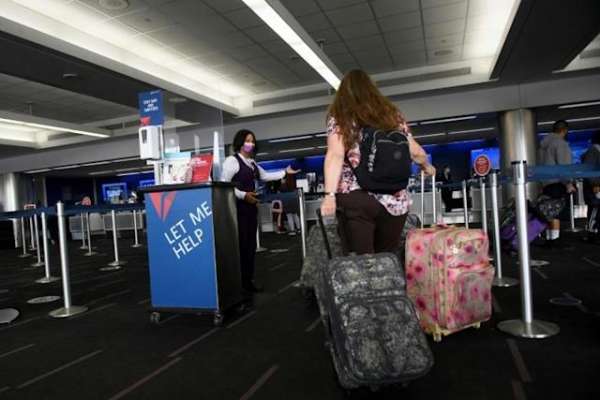The United States reopens its land and air borders Monday to foreign visitors fully vaccinated against COVID-19, ending 20 months of restrictions on travel from around the globe that separated families, hobbled tourism and strained diplomatic ties, IgbereTV reports.

The ban, imposed by former President Donald Trump in early 2020 and upheld by his successor Joe Biden, has been widely criticized and become emblematic of the upheavals caused by the pandemic.
The restrictions were particularly unpopular in Europe and US neighbours Canada and Mexico.
In an effort to slow the spread of the coronavirus, US borders were closed after March 2020 to travellers from large parts of the world, including the European Union, Britain and China, India and Brazil. Overland visitors from Mexico and Canada were also banned.
The months of restrictions affecting hundreds of millions of people helped fuel both personal and economic suffering brought on by the COVID-19 pandemic.
“It’s been so hard,” Alison Henry, 63, told AFP. “I just want to see my son.”
The British woman plans to fly Monday to see her son in New York, after 20 months of separation.
Families on both sides of the Atlantic are eager to finally reunite with their loved ones.
Although travel from the United States to Europe has been possible since the summer, foreign US residents holding certain visas have had no guarantee of being able to reenter the country.
To cope with surging demand, airlines have increased the number of transatlantic flights and plan to use larger planes, as they work their way out of the pandemic crisis.
Along the border with Mexico, many cities in the US states of Texas and California have faced economic struggles due to anti-COVID trade restrictions.
Meanwhile, Canadian seniors will be able to resume their annual car trips to Florida to escape the bitter northern winters.
But the cost of the PCR tests Canada is requiring for cross-border travel – up to $250 a pop – can be prohibitive.
Ann Patchett, an Ontario resident, told the Ottawa Citizen that it will cost $500 for her and her husband to go south to visit family.
“Do you want to hug your children? Do you want to tuck your grandchildren into bed?… It’s very frustrating,” she said.
New York congressman, Brian Higgins, whose district touches the Canadian border and includes the US side of Niagara Falls, plans to hold a news conference Monday with mayors from both countries to urge Canada to drop its testing requirement.







